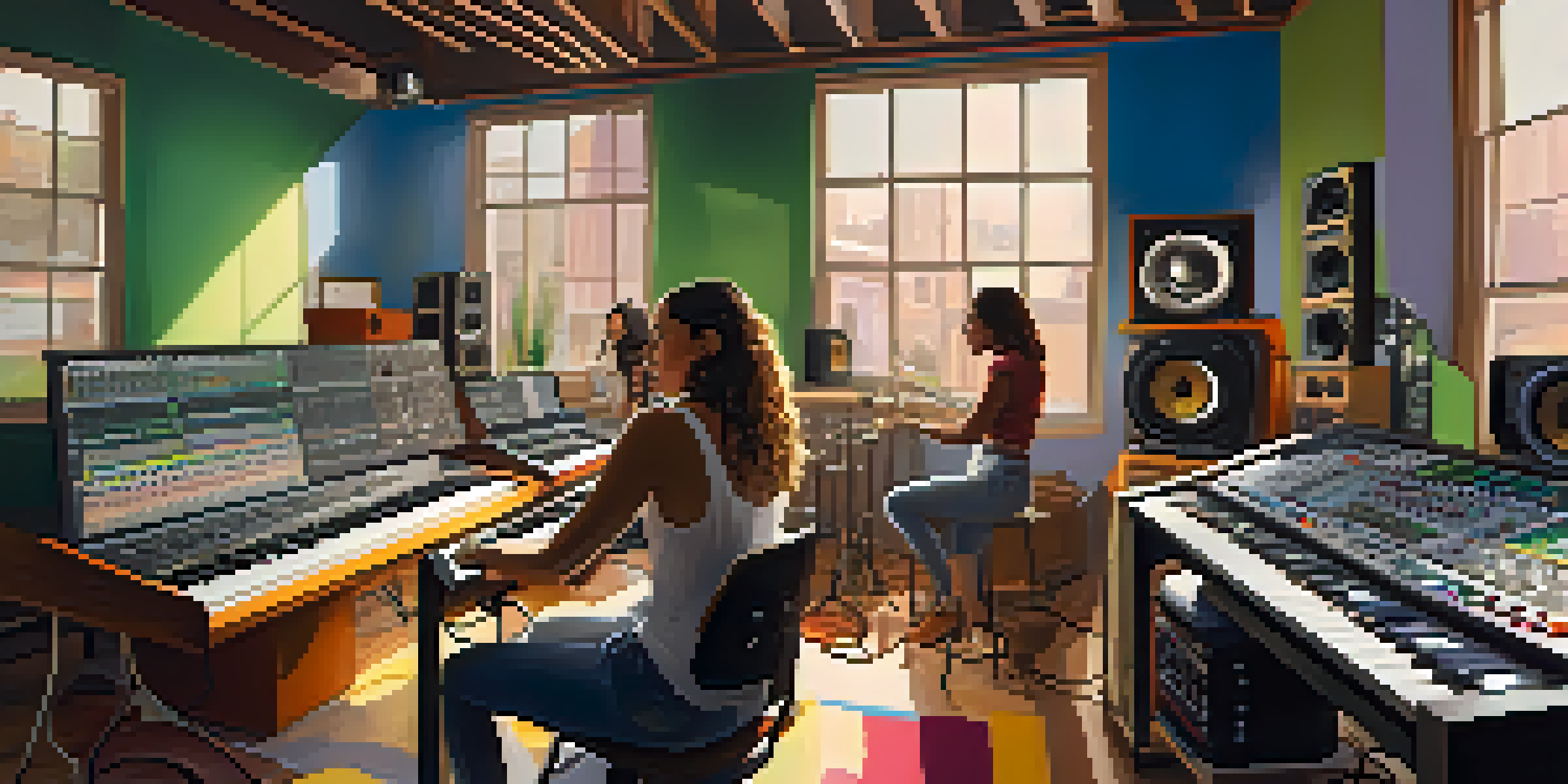Women in Music Production: Breaking the Glass Ceiling

The Historical Context of Women in Music Production
Historically, the music industry has been dominated by men, making it challenging for women to carve out their space. Many women who aspired to work behind the scenes often faced significant barriers, from gender bias to a lack of mentorship opportunities. However, these obstacles have not deterred countless women from pursuing their passion for music production and sound engineering.
The future belongs to those who believe in the beauty of their dreams.
In the early days of recording, women were often relegated to roles as secretaries or vocalists, with few opportunities for creativity in production. Yet, pioneers like Sylvia Robinson and Wendy Carlos began to break down these barriers, proving that women could be innovating forces in music. Their contributions laid the groundwork for future generations, inspiring women to enter the field.
As we look back, it's essential to recognize these trailblazers who paved the way for the next wave of female producers. Their legacies remind us that change is possible, and that each woman who steps into the studio helps to shatter the glass ceiling just a little bit more.
The Current Landscape: Women Making Waves
Fast forward to today, and the landscape of music production is evolving rapidly. More women are stepping into roles as producers, sound engineers, and composers, bringing fresh perspectives and creativity to the industry. Artists like Alicia Keys, Tinashe, and Billie Eilish exemplify how women are not just performers but also influential figures behind the scenes.

Organizations and initiatives aimed at supporting women in music production are gaining traction. For instance, programs like Women in Music and She Is The Music focus on providing resources, networking opportunities, and mentorship to aspiring female producers. These efforts are crucial in fostering an inclusive environment within the industry.
Women Breaking Barriers in Production
Many women are overcoming historical challenges to establish their presence and creativity in music production.
The visibility of women in music production is also on the rise, thanks to social media and industry events that spotlight female talent. This shift is not just about representation; it actively encourages young girls to dream big and see themselves in roles traditionally dominated by men.
Challenges Faced by Women in Music Production
Despite the progress, women in music production still encounter significant challenges. The industry can be notoriously competitive, and women often face skepticism about their skills and abilities. This is compounded by the stereotype that women are less technically proficient than their male counterparts, which can lead to a lack of confidence among aspiring female producers.
I think the best way to connect with people is through music, and I think the more women that are in the studio, the better.
Moreover, work-life balance remains a significant hurdle. Many women navigate the complexities of balancing career ambitions with personal responsibilities, often facing societal expectations that can impede their progress. This struggle for balance can make it tough for women to pursue opportunities that require long hours or travel.
It's crucial to address these challenges head-on and create supportive environments where women can thrive. By advocating for equitable practices and fostering inclusive spaces, the industry can ensure that female producers not only survive but thrive.
Mentorship: A Key to Success in Music Production
Mentorship plays a vital role in helping women navigate the music production landscape. Female mentors can provide guidance, share experiences, and offer insights that are often overlooked in male-dominated environments. Programs that connect aspiring producers with established professionals are essential for building a supportive network.
Many successful women in music production emphasize the importance of mentorship in their journeys. For instance, Grammy-winning producer Linda Perry has been vocal about the need to uplift emerging female talent, ensuring they receive the encouragement and opportunities they deserve. Such mentorship can be a game changer for women looking to break into the industry.
Mentorship Empowers Future Talent
Strong mentorship programs are crucial for supporting and guiding aspiring female producers in a male-dominated industry.
By fostering mentorship relationships, we can create a ripple effect that empowers the next generation of female producers. This support not only helps individuals but also strengthens the entire industry by diversifying perspectives and approaches to music creation.
Tools and Resources for Aspiring Female Producers
Today’s technology has made music production more accessible than ever, providing a wealth of tools for aspiring female producers. Digital audio workstations (DAWs) like Ableton Live, Logic Pro, and Pro Tools are user-friendly and offer extensive capabilities for creating and editing music. Online tutorials and courses have also proliferated, making it easier to learn the craft from the comfort of home.
In addition to formal education, many women are turning to online communities and forums for support and collaboration. Platforms like SoundBetter and Splice connect producers with each other, fostering collaboration and the sharing of resources. This sense of community can be incredibly empowering, especially for those who may feel isolated in a male-dominated field.
Utilizing these tools and resources not only enhances technical skills but also builds confidence. As more women familiarize themselves with the technology and practices of music production, they can challenge stereotypes and redefine what it means to be a female producer.
Celebrating Female Producers in the Spotlight
Celebrating the achievements of female producers is essential in inspiring future generations. High-profile figures like Imogen Heap, who has pushed the boundaries of technology in music, and producers like Fiona Apple and Linda Perry have demonstrated the incredible talent women bring to the industry. Their success stories serve as a beacon of hope for aspiring producers everywhere.
Awards shows and music festivals are also beginning to recognize female talent more prominently. Initiatives such as the Grammy Awards' Best Producer category and festivals that feature female-led lineups highlight the impact women are having in music production. These celebrations not only acknowledge achievements but also raise awareness about the need for continued support and representation.
Celebrating Female Achievements
Highlighting the successes of women in music production inspires the next generation and promotes greater diversity in the field.
By shining a light on successful female producers, we can create role models for young girls interested in music. These visible examples can help dismantle stereotypes and encourage more women to pursue careers in production.
The Future of Women in Music Production
The future for women in music production is bright, with increasing opportunities and support systems in place. As more women break into the industry, they are changing the narrative around who can be a producer. This shift is not just beneficial for women; it enriches the entire music industry by bringing diverse voices and perspectives to the forefront.
The ongoing conversation about gender equality is also pushing the industry to reevaluate its practices. Music labels and organizations are beginning to implement policies that promote diversity and inclusion, creating pathways for women to succeed. This momentum is vital in ensuring that the progress made is sustained over time.

As we look ahead, it's clear that women will continue to play a pivotal role in shaping the future of music production. With determination and support, the glass ceiling will continue to shatter, opening doors for even more talented women to leave their mark on the industry.